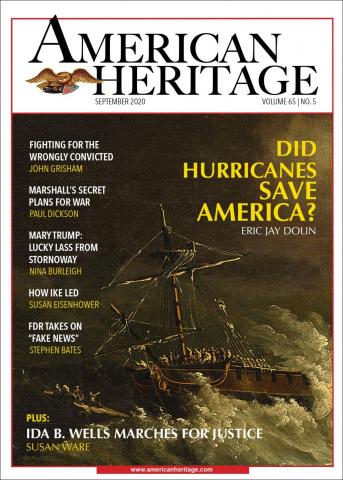Issue
September 2020, Volume 65, No.5
Featured Articles
Did Hurricanes Save America?
Author: Eric Jay Dolin
The outcome of the American Revolution may have been affected by catastrophic storms in the deadliest hurricane season in recorded history.
British Ships Lost in 1780 Hurricanes
Author: Edwin S. Grosvenor
Research by American Heritage reveals that the Royal Navy had 24 warships sunk or heavily damaged in October 1780, which must have affected Britain's ability to fight in the months before the surrender at Yorktown.
Fighting for the Wrongly Convicted
Author: John Grisham
Jim McCloskey and a handful of other advocates do the tough work of helping the wrongfully convicted.
Marshall's Secret Preparations for War
Author: Paul Dickson
When Germany unleashed its blitzkreig in 1939, the U.S. Army was only the 17th largest in the world. FDR and George Marshall had to build a fighting force able to take on the Nazis, against the wishes of many in Congress.
Ida B. Wells Marches for Justice
Author: Susan Ware
The ex-slave and investigative journalist spent a lifetime fighting against lynching and segregation — but also for voting rights for African-American women.
Mary Trump: The Lucky Lass from Stornoway
Author: Nina Burleigh
The daughter of a Gaelic-speaking fisherman on a remote Scottish island emigrated to New York, worked as a maid in the Carnegie Mansion, and married Fred Trump. Her son would become a tycoon like his father and then the president.
We've Got Mail!
Author: Bruce Watson
Every country has mail, but only in America is the daily mail part-ritual, part-Constitutional mandate.
Pandemics Change History
Author: David O. Stewart
As Covid-19 threatens to push millions of Americans into poverty, we can look to the past for lessons on how to deal with a pandemic.
FDR Takes on the Press
Author: Stephen Bates
FDR waged his own war on "fake news," specifically on the Chicago Tribune publisher Robert R. McCormick.
The Spirit of Chautauqua
Author: Bruce Watson
The force behind the early education and social movements—American curiosity—still lives on today.


